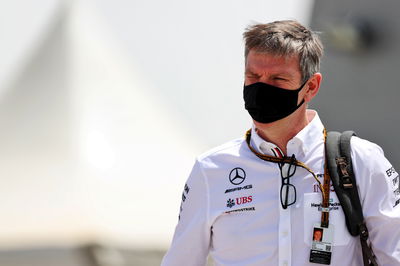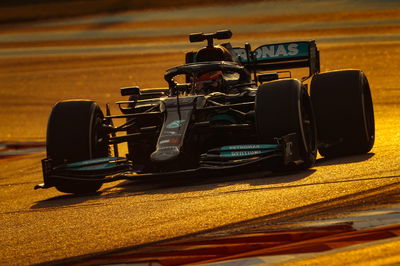Some teams will get 2022 F1 rules ‘really badly wrong’ - Allison

As part of F1’s objective to create cars that are more raceable on track, a new generation of car will be introduced for the upcoming campaign, featuring an entirely new set of rules.
Teams are currently finalising their designs that will include a ground-effect floor, simplified aerodynamic parts and 18-inch wheelrims ahead of next month’s opening pre-season test that kicks off in Barcelona on February 23.
Speaking in a Mercedes video previewing the new rules, Allison, who began his F1 career with Benetton in 1991, described the overhaul as the biggest he has ever experienced.
“We’ve been buried in them and the reality of making them real for so long that it’s easy to forget sometimes what a massive set of regulation changes these 2022 rules represent,” said Allison.
“I’ve been working in the sport for over 30 years and they dwarf anything else I’ve ever seen.
“I suspect if I were to dig out Wikipedia and go through every season of the sport that there’s ever been there would be nothing to match the scale of the change that comes with 2022.
“The rules set is not only enormous, the regulations are about twice the size of what’s preceded them, but they are almost entirely different from what came before them and that has meant that we’ve had to reinvent the car tip to toe.
“Everywhere you look it’s completely new. Not just new as in new parts, but new as in completely new philosophy, a completely different aerodynamic package, different brakes, different wheels, crucially different tyres and even the engine, one of the things that is less touched by the regulations than many, even there the power unit has to be prepared so that it can be frozen for three years.”

Allison believes that any team who makes a serious error with their new design will face “a terribly painful year”.
“I would imagine, given that the cars are so new and so different, that one or two cars on the grid will have got it really badly wrong. And they will have a terribly painful year,” he explained.
“I would imagine that all of us to some degree will have will have left things on the table that we just didn't anticipate. And we will look at other cars and think ‘oh, why didn't we think of that?’
“Then we'll be scrambling around to try to get that idea onto our car as fast as possible, so that we can claw our way, from whatever position we land in that first race, forwards. Or, if we're lucky enough to be in front, to keep the attacking wolves behind us.
“It's going to be quite a rush and definitely something that's going to keep us all from having too much sleep for the whole of the season.”
After largely dominating the V6 hybrid era, Allison insisted Mercedes is relishing the challenge the rules overhaul presents.
“When the regulations change in such large measure as these ones, then we approach that with all the fun and relish that that challenge deserves,” he said.
“Our job is to look for technical opportunity and regulations, and then use our combined wit and skill and all the effort that we make collectively, to try to find a configuration of car that will be better than anyone else's approach to it.
“When everything is as new as this, then everywhere you look in that regulation set, twice as thick as the old one, there's opportunity.
“There's opportunity and of course there's jeopardy. And we try to pick our way through the potential minefield and pick up all the little boxes of treasure that may be set in amongst the landmines, to end up with a car that we hope will see us pitching at the front of the grid.”
According to Allison, Mercedes is also determined to prove that its run of eight consecutive constructors’ championships and seven drivers’ championships between 2014-2021 was not down to luck.
“We see it as an opportunity to show that we haven’t just been lucky over the years, we haven’t merely stumbled into a formula,” he added.
“It’s often talked about as the turbo-hybrid era as if we sort of stumbled into some god-given right to have been dominant all these last seasons.
“We see every single regulation change as an opportunity to pit our wits against them and see whether we actually deserve still to be competitive, to see whether or not we can show afresh that we’ve understood the physics behind the car, that we’ve tried to translate that into designs and concepts that we then realise in manufacturing and then deliver to the track in a way that allows us to be competitive once more.”
New year, new car, new era of Formula One! A lot has changed for F1 2022…
— Mercedes-AMG PETRONAS F1 Team (@MercedesAMGF1) January 24, 2022
In episode one of our new series, James Allison sets the scene for us, talking through just how significant these regulation changes are…

![Toprak Razgatlioglu, ROKiT BMW Motorrad, BMW M 1000 RR [Gold & Goose]](https://cdn.crash.net/2024-09/GnG_1165424_HiRes.jpg?height=90)






![Johann Zarco, LCR, Honda RC213V, 2024 San Marino MotoGP, Misano, action [Gold & Goose]](https://cdn.crash.net/2024-09/GnG_1166323_HiRes.jpg?height=90)

![Jack Miller, KTM Factory Racing, KTM RC16, San Marino MotoGP, Misano, action [Gold & Goose]](https://cdn.crash.net/2024-09/GnG_1167624_HiRes.jpg?height=90)